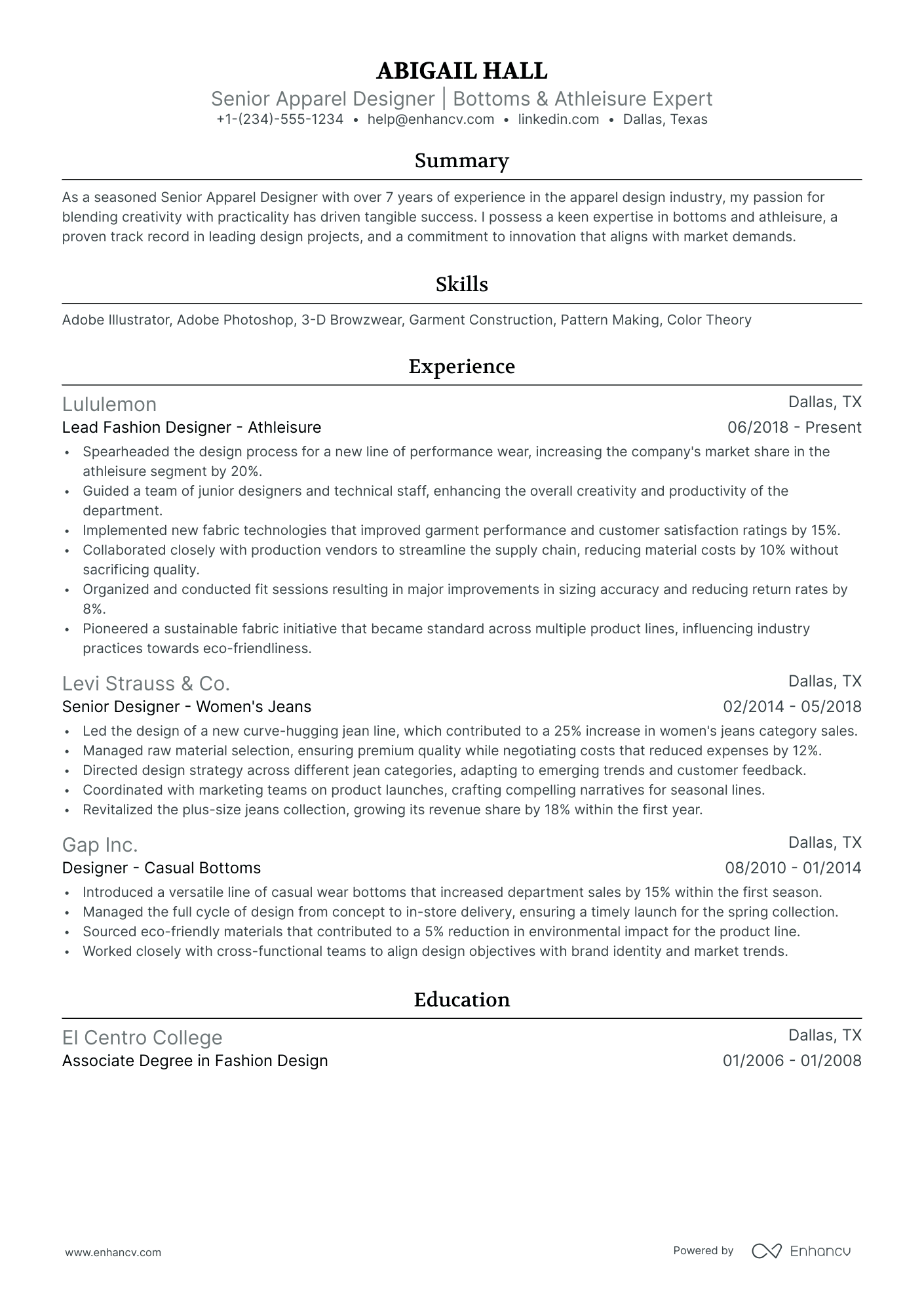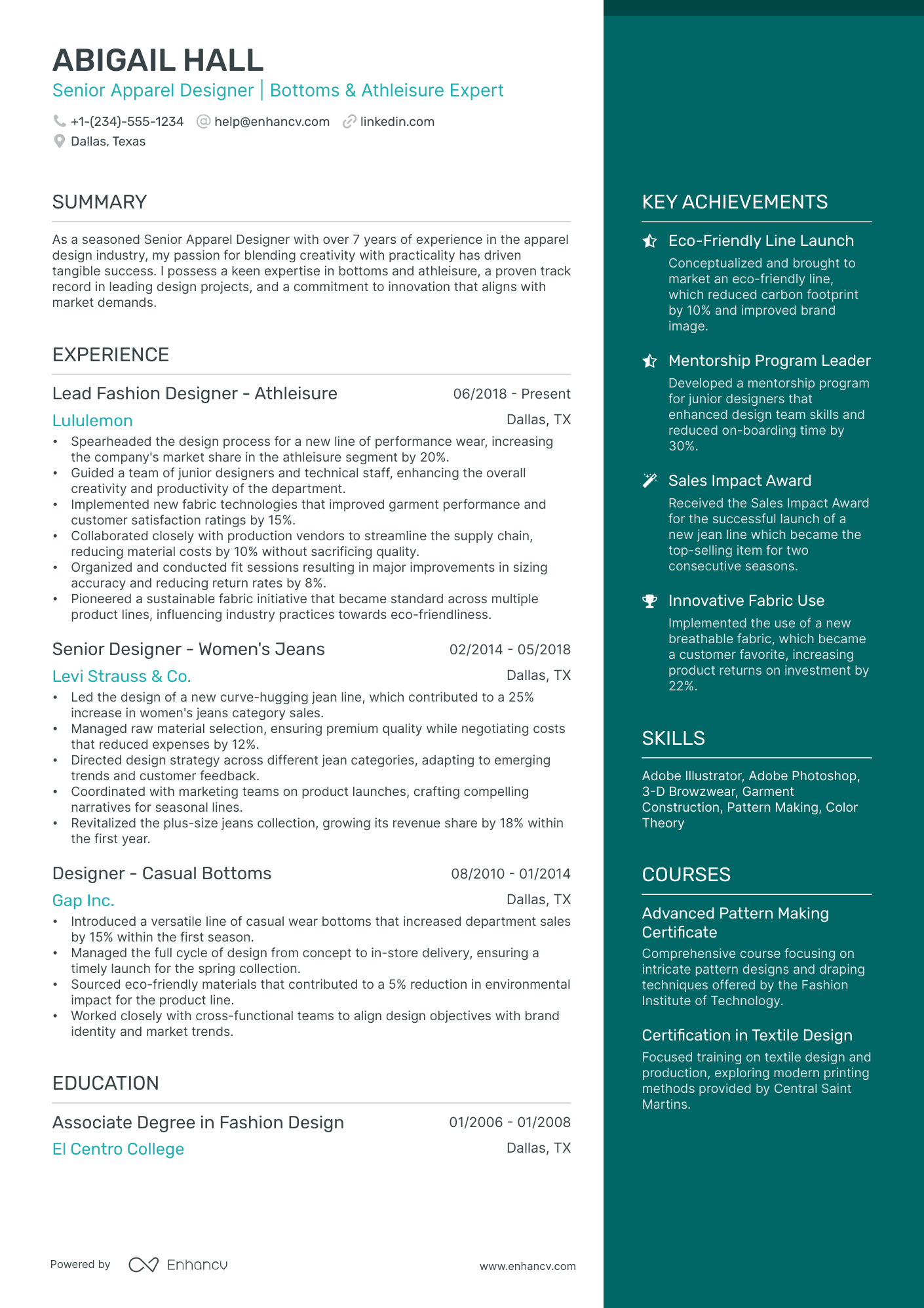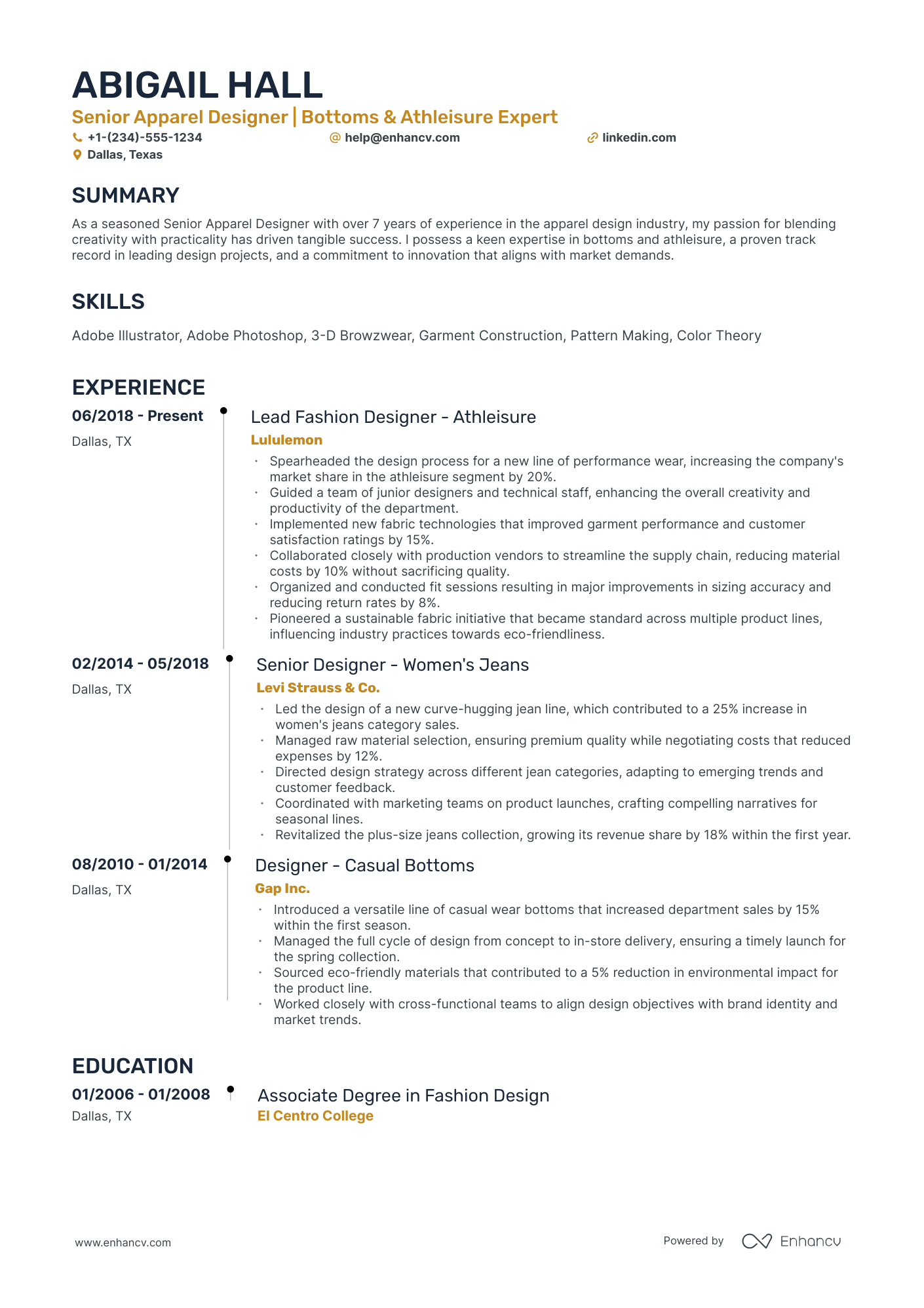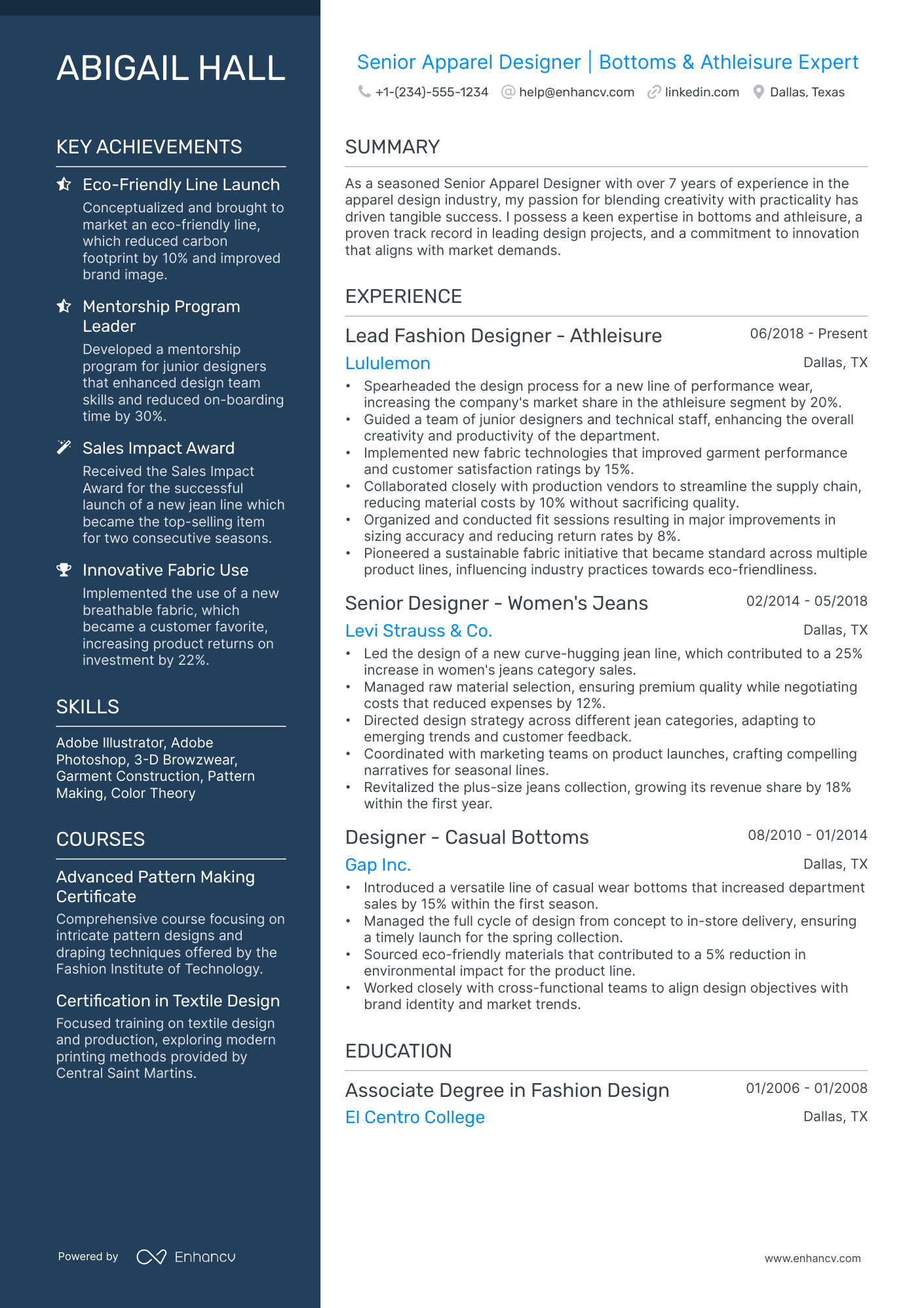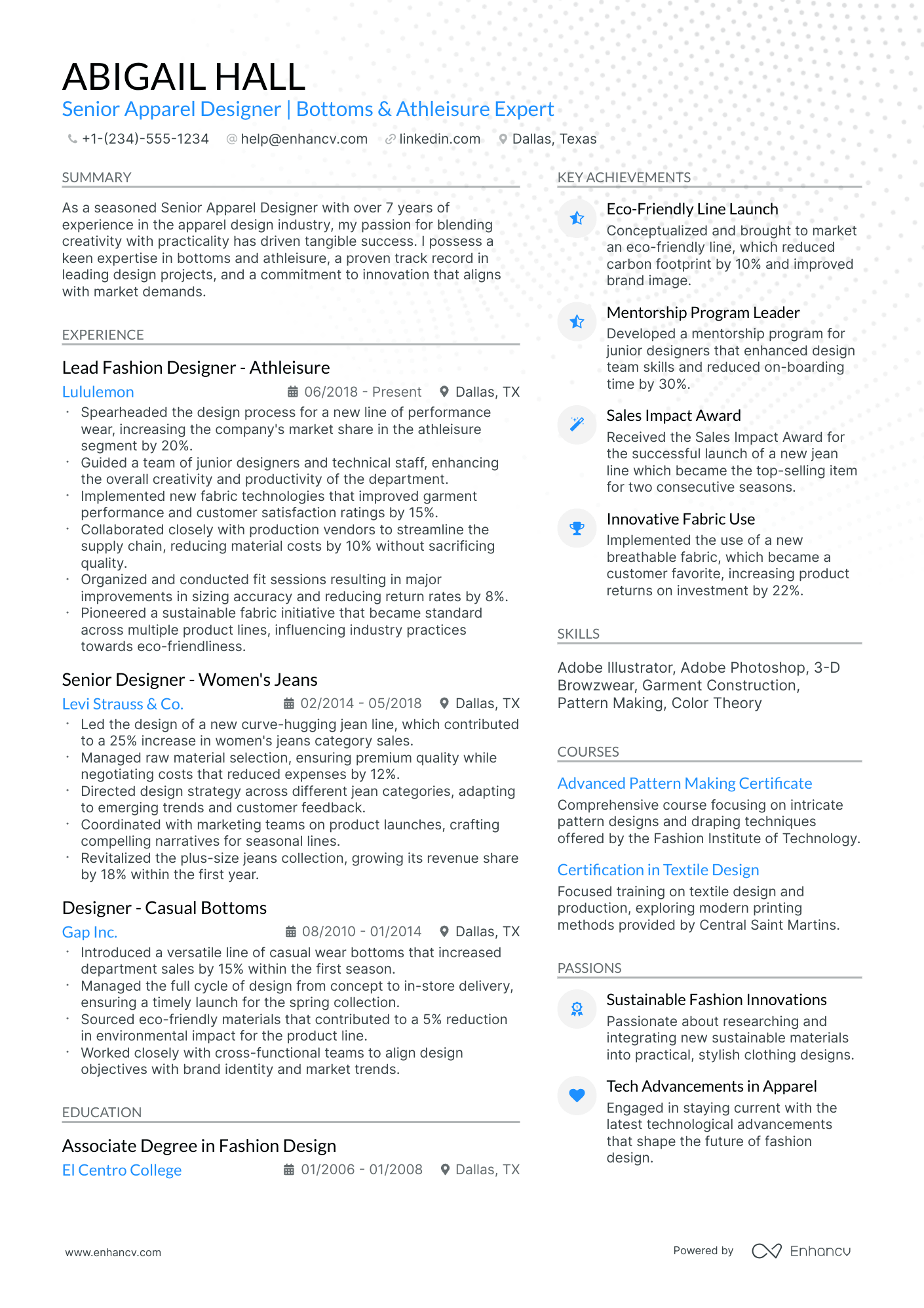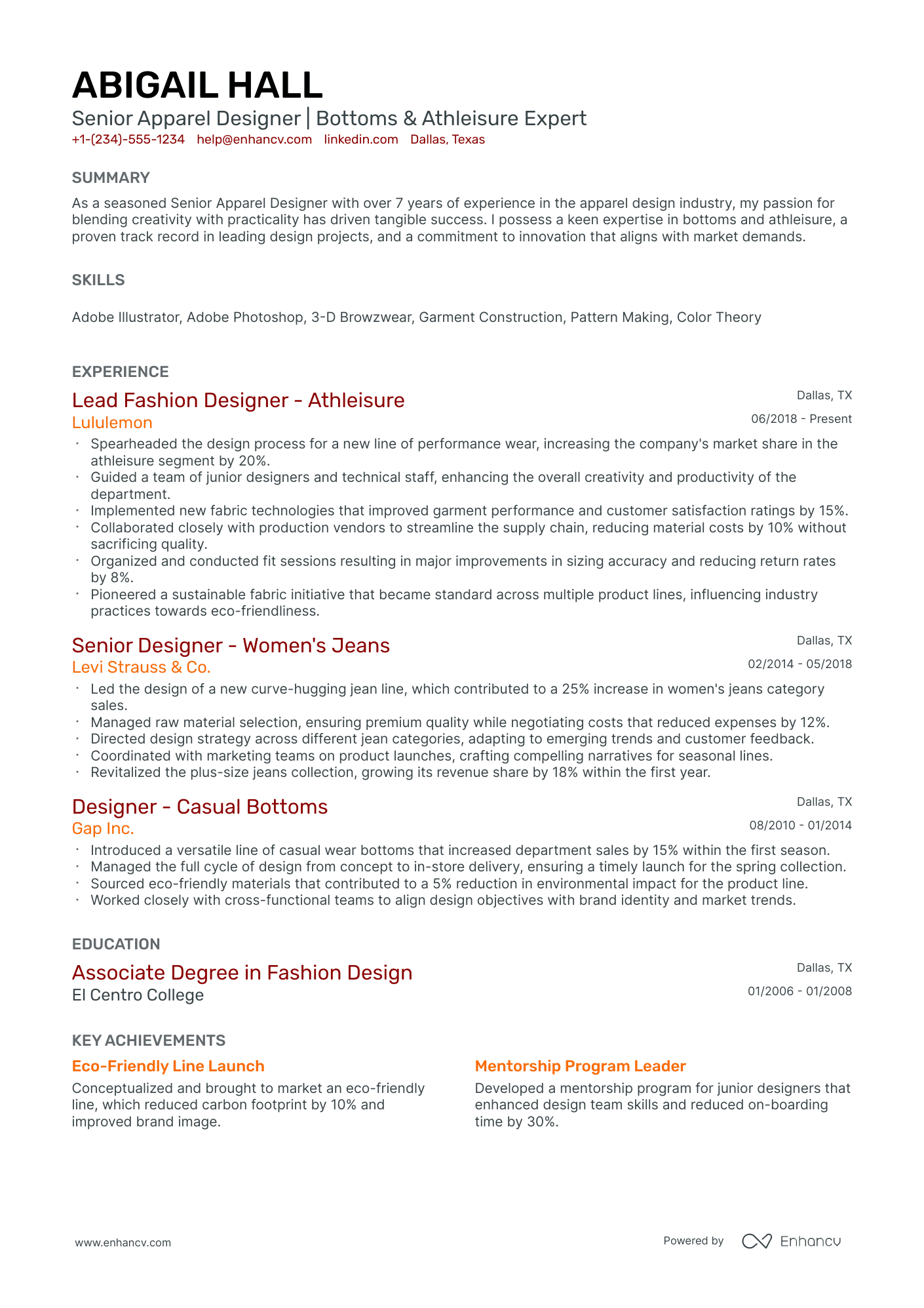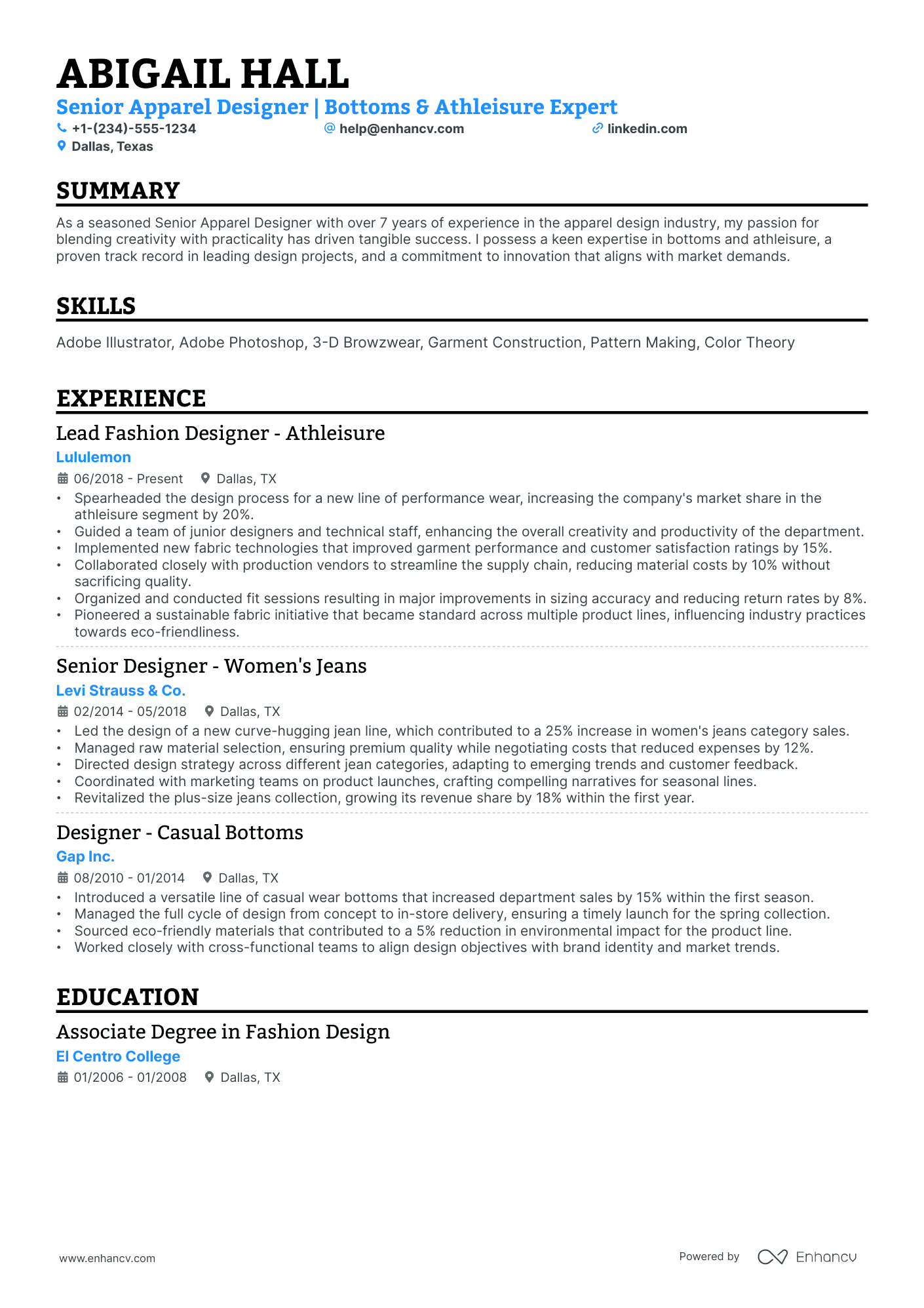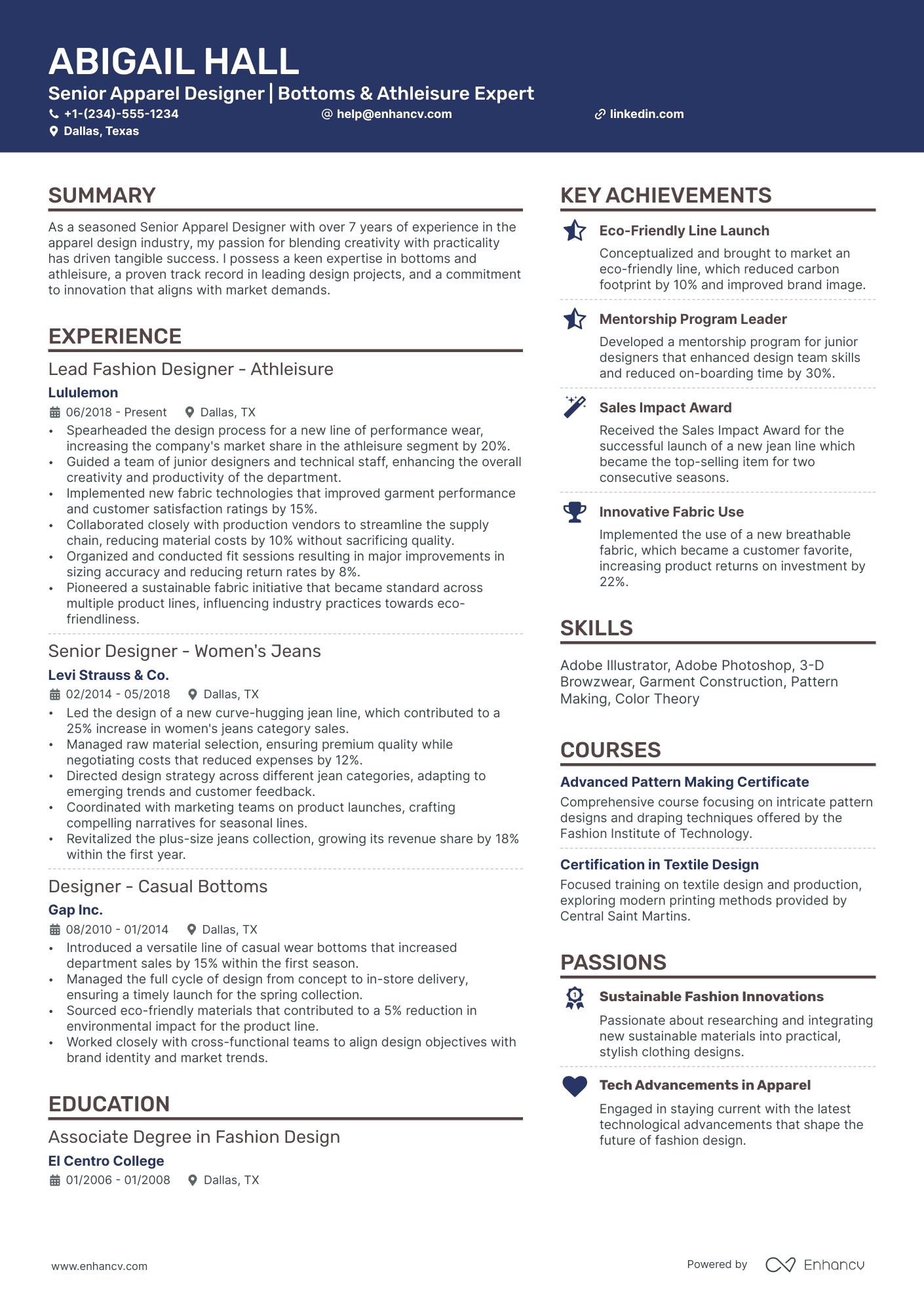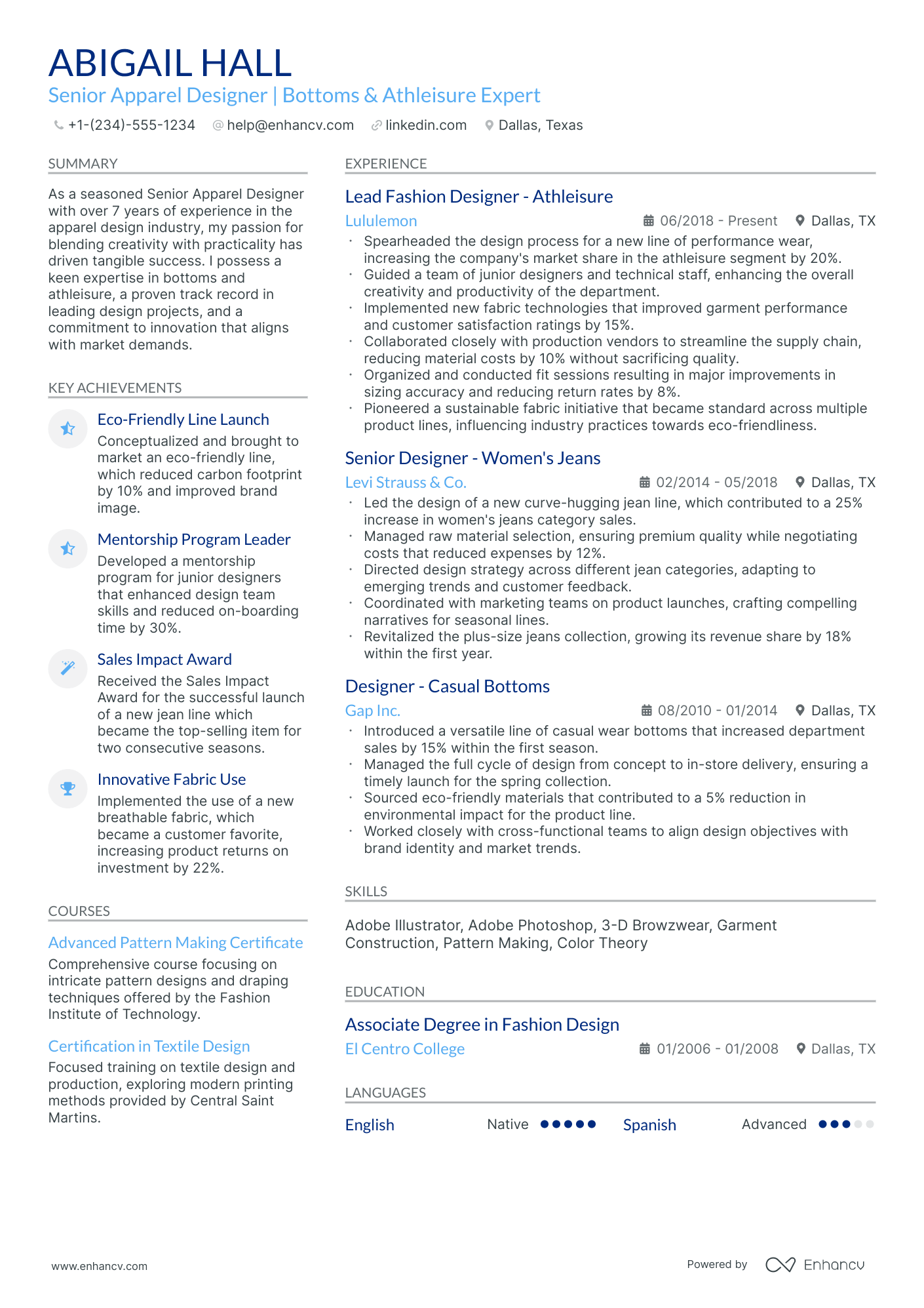One resume challenge you might face as a freelance designer is effectively showcasing a diverse portfolio while still keeping your resume concise and relevant. Our guide provides you with the tools to strategically curate your projects, ensuring your resume strikes that perfect balance between variety and precision, helping you stand out to potential clients or employers.
- Utilize real-life examples to refine your freelance designer resume;
- Effectively write the experience section of your freelance designer resume, even if you have minimal or no professional experience;
- Incorporate the industry's top 10 essential skills throughout your resume;
- Include your education and certifications to highlight your specific expertise.
If the freelance designer resume isn't the right one for you, take a look at other related guides we have:
- Freelance Programmer Resume Example
- Freelance Editor Resume Example
- Freelance Interpreter Resume Example
- Freelance Tutor Resume Example
- Freelance Video Editor Resume Example
- Freelance Copy Editor Resume Example
- Freelance Producer Resume Example
- Freelance Photographer Resume Example
- Freelance Content Writer Resume Example
- Freelance Project Manager Resume Example
Enhancing your freelance designer resume: format and layout tips
"Less is more" - this principle is key for your freelance designer resume design. It emphasizes the importance of focusing on why you're the ideal candidate. Simultaneously, it's crucial to select a resume design that is both clear and simple, ensuring your qualifications are easily readable.
Four popular formatting rules (and an additional tip) are here to optimize your freelance designer resume:
- Listing experience in reverse chronological order - start with your most recent job experiences. This layout helps recruiters see your career progression and emphasizes your most relevant roles.
- Including contact details in the header - make sure your contact information is easily accessible at the top of your resume. In the header, you might also include a professional photo.
- Aligning your expertise with the job requirements - this involves adding essential sections such as experience, skills, and education that match the job you're applying for.
- Curating your expertise on a single page - if your experience spans over a decade, a two-page resume is also acceptable.
Bonus tip: Ensure your freelance designer resume is in PDF format when submitting. This format maintains the integrity of images, icons, and layout, making your resume easier to share.
Finally, concerning your resume format and the Applicant Tracker System (ATS):
- Use simple yet modern fonts like Rubik, Lato, Montserrat, etc.
- All serif and sans-serif fonts are friendly to ATS systems. Avoid script fonts that look like handwriting, however.
- Fonts such as Ariel and Times New Roman are suitable, though commonly used.
- Both single and double-column resumes can perform well with the ATS.
Targeting Canada? – Keep in mind their resume layout may differ from others.
Upload & Check Your Resume
Drop your resume here or choose a file. PDF & DOCX only. Max 2MB file size.
PRO TIP
The more time and effort you've put into obtaining the relevant certificate, the closer to the top it should be listed. This is especially important for more senior roles and if the company you're applying for is more forward-facing.
The key to your freelance designer job-winning resume - present your expertise with these sections:
- A header to make your resume more scannable
- Snapshot of who you are as a professional with your resume soft skills, achievements, and summary or objective
- Job advert keywords in the skills section of your resume
- Resume experience quantifying your past job successes with metrics
- A relevant education, certification, and technical sills section to provide background to your technological/software capabilities
What recruiters want to see on your resume:
- Demonstrated design skills with a strong portfolio showcasing a range of projects and design aesthetics
- Proficiency in design software (e.g., Adobe Creative Suite, Sketch, Figma)
- Experience with a variety of design disciplines such as web design, mobile app design, branding, and graphic design
- Ability to communicate design concepts and work with clients or team members effectively
- History of meeting deadlines and managing multiple projects simultaneously
Quick guide to your freelance designer resume experience section
After deciding on the format of your resume, it's time to organize your experience within the dedicated section.
It's common for freelance designer professionals to be confused in this part of the process, as they may have too much or little expertise.
Follow the general rules of thumb to be successful when writing this part of your resume:
- The perfect number of bullets you should have under each experience item is no more than six;
- Select not merely your responsibilities, but the most noteworthy achievements for each role that match the job requirements;
- List any certificates or technical expertise you've gained on the job and how they've helped you progress as a professional;
- Carefully select the power verbs to go along with each bullet to avoid generic ones like "managed" and instead substitute those with the actuality of your particular responsibility;
- Integrate valuable keywords from the job advert in the form of achievements under each role you list.
If you're on the search for further advice on how to write your freelance designer experience section, get some ideas from real-world professional resumes:
- Designed user-friendly interface prototypes for 10+ mobile applications, enhancing customer satisfaction and user experience.
- Directed visual branding strategy for start-up companies, contributing to a 40% increase in their market presence.
- Streamlined clients’ website designs, improving navigation and increasing traffic by 65% within six months after implementation.
- Created over 200 custom logos, helping businesses establish a distinctive brand identity across various industries.
- Led the graphic design for an award-winning marketing campaign, which garnered the Silver ADDY Award for excellence in advertising.
- Managed clients' design projects from concept to production, ensuring deadlines were met and expectations exceeded.
- Revitalized online presence for 15+ companies by designing interactive websites with responsive layouts leading to a measurable increase in user engagement.
- Collaborated with writers and marketers to create cohesive design language for multimedia advertising campaigns.
- Implemented A/B testing for web page designs, which enhanced CTA conversions by 30% for several clients.
- Developed 50+ e-commerce websites using platforms like Shopify, boosting clients’ sales revenues by an average of 58% within the first year.
- Conducted usability testing for various online platforms, ensuring optimal performance across different devices and browsers.
- Partnered with digital marketers to integrate SEO principles in designs, effectively doubling organic traffic for majority of clients.
- Orchestrated the full rebrand of a mid-sized retail chain, resulting in a 32% increase in brand recognition after the launch.
- Innovated digital illustration methods for children's books that resulted in a 20% faster production time per publication.
- Sourced and managed printing vendors for various projects, reducing material costs by 25% through effective negotiation.
- Executed engaging online ad campaigns for tech startups which saw user acquisition soar by over 200% in their first quarter post-launch.
- Utilized cutting-edge design software to create high-fidelity mockups and dynamic animations for client presentations.
- Educated clients on the importance of strong visual identities, leading to a portfolio of over 30 long-term contracts.
- Facilitated the transition of a national magazine to a fully digital format, tripling their online subscriber base within two years.
- Implemented an innovative design pipeline using Figma and InVision which decreased project turnaround time by 40%.
- Crafted comprehensive brand guidelines for emerging companies to ensure consistency across all marketing materials.
- Spearheaded UI/UX redesign project for a major financial services app, which improved customer ratings from 3.2 to 4.7 stars on the app stores.
- Developed interactive prototypes for VR applications, paving the way for new educational tools used in classrooms nationwide.
- Optimized asset workflows for game design projects, cutting down production time by up to 25% and allowing faster go-to-market.
Quantifying impact on your resume
- Include the number of design projects completed to demonstrate experience and productivity.
- Specify the percentage of client satisfaction rate to highlight reliable quality of work.
- Mention the average turnaround time for design projects to showcase efficiency.
- List any increases in client engagement metrics resulting from your design work to show effectiveness.
- Quantify the size of the audiences reached by your designs to reveal the extent of your impact.
- State any cost reductions achieved through your design solutions to exhibit economic value.
- Detail the number of design awards won or nominations received to convey recognition by the industry.
- Report the number of successful brand launches or rebrands you have contributed to, indicating market impact.
Action verbs for your freelance designer resume
What to do if you don't have any experience
It's quite often that candidates without relevant work experience apply for a more entry-level role - and they end up getting hired.
Candidate resumes without experience have these four elements in common:
- Instead of listing their experience in reverse-chronological format (starting with the latest), they've selected a functional-skill-based format. In that way, freelance designer resumes become more focused on strengths and skills
- Transferrable skills - or ones obtained thanks to work and life experience - have become the core of the resume
- Within the objective, you'd find career achievements, the reason behind the application, and the unique value the candidate brings about to the specific role
- Candidate skills are selected to cover basic requirements, but also show any niche expertise.
Recommended reads:
PRO TIP
The more trusted the organization you've attained your certificate (or degree) from, the more credible your skill set would be.
Key hard skills and soft skills for your freelance designer resume
At the top of any recruiter freelance designer checklist, you'd discover a list of technical competencies, balanced with personal skills.
Hard or technical skills are your opportunity to show how you meet the essential responsibilities of the role. The ability to use a particular job-crucial technology or software would also hint to recruiters whether you'd need a prolonged period of on-the-job training - or you'd fit right in the job.
But to land your dream role, you'd also need to demonstrate a variety of soft or people resume skills . Employers care about soft skills as they show how each candidate would fit into the team and company culture.
Both types of skills are specific and to best curate them on your resume, you'd need to:
- Create a skill section within which you showcase your hard and soft skills and present how they help you succeed.
- List specific examples of projects, tasks, or competitions, within which your skill set has assisted your results.
- Soft skills are harder to measure, so think about situations in which they've helped you thrive. Describe those situations concisely, focusing on how the outcome has helped you grow as a professional.
- Metrics of success - like positive ROI or optimized workplace processes - are the best way to prove your technical and people skills.
Take a look at some of freelance designer industry leaders' favorite hard skills and soft skills, as listed on their resumes.
Top skills for your freelance designer resume:
Adobe Photoshop
Adobe Illustrator
Sketch
Figma
InDesign
HTML/CSS
Adobe XD
CorelDRAW
Canva
Web Design
Creativity
Time Management
Communication
Problem Solving
Adaptability
Attention to Detail
Collaboration
Client Management
Critical Thinking
Self-Motivation
PRO TIP
Highlight any significant extracurricular activities that demonstrate valuable skills or leadership.
Education section and most popular freelance designer certifications for your resume
Your resume education section is crucial. It can indicate a range of skills and experiences pertinent to the position.
- Mention only post-secondary qualifications, noting the institution and duration.
- If you're still studying, highlight your anticipated graduation date.
- Omit qualifications not pertinent to the role or sector.
- If it provides a chance to emphasize your accomplishments, describe your educational background, especially in a research-intensive setting.
Recruiters value freelance designer candidates who have invested their personal time into their professional growth. That's why you should include both your relevant education and certification . Not only will this help you stand out amongst candidates, but showcase your dedication to the field. On your freelance designer resume, ensure you've:
- Curated degrees and certificates that are relevant to the role
- Shown the institution you've obtained them from - for credibility
- Include the start and end dates (or if your education/certification is pending) to potentially fill in your experience gaps
- If applicable, include a couple of job advert keywords (skills or technologies) as part of the certification or degree description
If you decide to list miscellaneous certificates (that are irrelevant to the role), do so closer to the bottom of your resume. In that way, they'd come across as part of your personal interests, instead of experience. The team at Enhancv has created for you a list of the most popular freelance designer certificates - to help you update your resume quicker:
The top 5 certifications for your freelance designer resume:
- Adobe Certified Expert (ACE) - Adobe
- Certified Graphic Designer (CGD) - Graphic Designers of Canada
- User Experience (UX) Design Certificate - Nielsen Norman Group
- Graphic Design Certification - The American Institute of Graphic Arts (AIGA)
- Interaction Design Foundation (IDF) Certification - Interaction Design Foundation
PRO TIP
If the certificate you've obtained is especially vital for the industry or company, include it as part of your name within the resume headline.
Recommended reads:
Writing the freelance designer resume summary or objective: achievements, keywords, dreams, and more
Deciding on whether to include a resume summary or resume objective should entirely depend on your career situation.
If you have:
- Plenty of relevant achievements you'd like to bring recruiters' focus to, make use of the resume summary. Ensure each of your achievements is quantified with concrete proof (e.g. % of cases solved).
- Less applicable experience, utilize the resume objective. Within the objective include a few noteworthy, past successes, followed up by your professional dreams.
As a bonus, you could define in either your freelance designer resume summary or objective what makes you the perfect candidate for the role.
Think about your unique hard and soft skills that would make your expertise even more important to the job.
These freelance designer professionals have completely covered the formula for the ideal resume introduction:
Resume summaries for a freelance designer job
- With a decade of proven expertise in graphic design at a top New York advertising firm, I bring a deep understanding of visual branding and communication. I possess mastery in Adobe Creative Suite, coupled with a portfolio showcasing multiple award-winning campaigns for international clients.
- Dedicated UI/UX designer with over 5 years of experience creating intuitive interfaces for tech startups in Silicon Valley. Skilled in Sketch, Figma, and prototyping tools, my work has directly contributed to a 30% increase in user engagement for a flagship product.
- Transitioning from a successful photography business, my keen eye for aesthetics and storytelling is now channeled into creating impactful designs. With an extensive background in Adobe Photoshop and Lightroom, I am stepping into the graphic design industry to bring fresh visual perspectives to digital content.
- As a former marketing manager with 7 years in the field, my unique insights into consumer psychology and brand positioning are invaluable assets in my newfound career as a freelance designer. Fluency in Illustrator and InDesign has enabled me to craft compelling visuals that resonate with target audiences.
- Eager to embark upon a new journey in the design landscape, my enthusiasm for art and technology drives me to develop innovative visual solutions. With a strong foundation in creative software and a dedication to continuous learning, I aim to contribute fresh ideas and grow as a professional designer.
- Coming from a background in architecture, my aim is to leverage strong spatial design principles and attention to detail in the realm of graphic design. While I have no professional design experience, my proficiency in AutoCAD and 3D rendering software primes me for a smooth transition and a swift learning curve.
Recruiters' favorite additional freelance designer resume sections
When writing your freelance designer resume, you may be thinking to yourself, " Is there anything more I can add on to stand out? ".
Include any of the below four sections you deem relevant, to ensure your freelance designer resume further builds up your professional and personal profile:
Key takeaways
At the end of our guide, we'd like to remind you to:
- Invest in a simple, modern resume design that is ATS friendly and keeps your experience organized and legible;
- Avoid just listing your responsibilities in your experience section, but rather focus on quantifiable achievements;
- Always select resume sections that are relevant to the role and can answer job requirements. Sometimes your volunteering experience could bring more value than irrelevant work experience;
- Balance your technical background with your personality traits across various sections of your resume to hint at how much time employers would have to invest in training you and if your profile would be a good cultural fit to the organization;
- Include your academic background (in the form of your relevant higher education degrees and certifications) to show recruiters that you have the technical basics of the industry covered.
